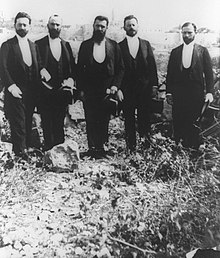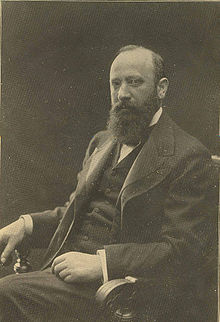David Wolffsohn
David Wolffsohn (born October 9, 1855 in Dorbiany, Kovno Gouvernement ; died September 15, 1914 in Homburg vd H. ) was a leading figure in the early days of political Zionism and, as the successor to Theodor Herzl, President of the World Zionist Organization .
Life
David Wolffsohn was born in Dorbiany, Kovno governorate, the son of a teacher and received a religious education. At the age of thirteen he came across the Russian border to Memel , at that time the border town of the German Empire , and without any previous training and with minimal knowledge of German, he entered a timber business. In Memel, the Zionist rabbi Isaak Rülf took on the bright boy and gained decisive influence over him.
In 1872 Wolffsohn moved to Lyck in East Prussia for a commercial apprenticeship and lived in the house of the writer David Gordon , the editor of Ha-Magid , who inspired Wolffsohn for national Jewish ideas. In 1873 he was sent to his brother's to avoid being drafted into the tsarist army. Several unsuccessful attempts to gain a firm foothold followed, and after years of great material hardship, he moved to Papenburg in Friesland , where he was able to do business successfully for the first time and became a co-owner of the flourishing timber trading company Bernstein ( A. Bernstein , which was then called Bernstein & Wolffsohn traded); there he also founded a synagogue.
In 1888 Wolffsohn moved the company headquarters to Cologne , settled there himself and became very wealthy through restless activity. In Cologne he joined the Chowewe Zion movement and in 1893, together with Max I. Bodenheimer, founded the "Cologne Association for the Promotion of Agriculture and Crafts in Palestine" and in 1894 the Jewish-National Association . Wolffsohn's inclination for Zionism grew with the publication of Theodor Herzl's book Der Judenstaat . In 1896 he met Herzl, immediately promised him his support and became his companion and friend. Their relationship was so strong that he even became the guardian of Herzl's children.
He took a lively interest in the organization of the first Zionist Congress in 1897 and has been one of the most active champions of the Zionist idea ever since. His commercial knowledge was particularly useful to Herzl when it came to setting up the Jewish Colonial Trust in London , and Wolffsohn helped Herzl, who was not always psychologically adept, to bring the harshness of his leadership to the top and to act in a balancing way among the nationally and internationally involved Zionist leaders. Wolffsohn became President and Supervisory Board of the bank during Herzl's lifetime.
He accompanied Herzl on his travels to London, Constantinople and Palestine and also took part in the reception by Wilhelm II in 1898 in Jerusalem . Wolffsohn was Herzl's companion and advisor on other trips as well. Herzl's early death plunged Wolffsohn into a deep depression, which he tried to compensate for by intensifying, tireless work for the Zionist cause. Wolffsohn spoke the words at Herzl's grave:

“You did not want speeches to be made at your grave. Your will is sacred to us. But we want to swear that we will continue the work you have started with all our might, we want to swear that we will always keep your name holy and that you will never be forgotten as long as a Jew lives on earth "
- and then he swore with a raised hand:
"May my rights wither if I forget yours, Jerusalem."
Wolffsohn soon afterwards - initiated and prepared by Herzl - issued an appeal to the Jewish people , which addressed to all Jews, but above all to all Zionists, with the request “to give the children of Herzl what their father gave us has withdrawn for love and benefit ”. The result was pathetic, only after many admonitions were smaller sums collected. Wolffsohn took over Herzl's legacy and arranged the estate with Leon Kellner and Johann Kremenezky , initiated the first publication of Herzl's collected writings, became his executor, guardian of his children and looked after them.
After Herzl's death there was a vacuum in the leadership of the movement. Various candidates were under discussion as Herzl's successor, and finally, at the seventh Zionist Congress in 1905, three received approval to be nominated as a presidential candidate for the World Zionist Organization: Wolffsohn (who vehemently resisted), Nordau and Otto Warburg . At the eighth congress in 1907 Wolffsohn was elected President of the Zionist Organization, and from then on Wolffsohn tried to find a "middle position" between purely political Zionism (obtaining the "Charter" according to Herzl's specifications) and the camp of the "practical", led above all from Ussishkin , to preserve. The opposition to this path became stronger and stronger, apart from Ussischkin also from Weizmann , not to mention the “territorialistic” special path that Zangwill and his supporters sought.
Wolffsohn continued to work tirelessly at home and abroad, several trips to Constantinople (where the negotiations with the Sultan were promising, but the revolution of the Young Turks again thwarted all plans) were aimed at propaganda and the political mediation of the Zionist idea.
In 1907 he also traveled to Russia, where he was received in long audiences by Prime Minister Pyotr Arkadjewitsch Stolypin and Foreign Minister Alexander Petrovich Iswolski . He then visited Hungary and had an audience with the Minister of the Interior, Count Andrassy . Wolffsohn's efforts in Russia and Hungary helped ensure the continued existence of the movement in both countries.
In 1909 Wolffsohn traveled again to Constantinople, this time accompanied by Sokolov , made contact with the new political leadership and promoted Zionist public relations work by being able to buy a newspaper ( Curier d'Orient ) that could be used for appropriate propaganda purposes.
Wolffsohn was confirmed as president at the ninth congress, December 1909, although he was faced with a strong opposition that only accepted a "provisional" (re-election of the old leadership), whereupon he lost many powerful supporters to the opposition and at the tenth congress 1911, physically broken and nervous, resigned. He was able to win the majority again and could have remained president, but in view of his state of health he renounced it, so that the leadership passed to Otto Warburg. Wolffsohn remained active on the financial and economic side of the movement.
At the eleventh congress in Vienna in September 1913, Wolffsohn presided again and successfully fought not to hand over the Zionist financial organizations to the “uncommercial cultural Zionist direction”.
Wolffsohn then planned to emigrate to Eretz Israel , bought a large piece of land near Jaffa a few months after the congress , but could no longer fulfill this wish: Wolffsohn , who had a heart condition, died on the return journey from a spa stay in Switzerland on September 15, 1914 in Bad Homburg vor der Höhe and was buried on September 18, 1914 in the Jewish cemetery in Cologne-Deutz next to his wife Fanny, who died in 1912. In 1952 his remains were transferred to Jerusalem with those of his wife and buried next to those of Theodor Herzl on the Herzlberg .
While Herzl was still alive, Wolffsohn, with his religious background, suggested that the movement's flag should be blue on white, like a tallit . It was then shown to the public for the first time on July 21, 1891 at the dedication of the Zion Hall in Boston . It was hoisted for the first time in Palestine on May 14, 1948 and officially confirmed as the flag of the Jewish state on September 12, 1948 . Wolffsohn also suggested that the members of the movement should undertake to pay the shekel.
At the seventh congress in 1905, the Uganda plan was rejected and the Basel program, which supported an increase in settlement activity, was adopted. At this point Wolffsohn was already trying to bridge the gap between "political" and "practical" Zionists. After the seventh congress, Wolffsohn moved all Zionist offices to Cologne. This also encouraged the Jewish National Fund to move its headquarters to Cologne. Wolffsohn asked Nachum Sokolow to become the organization's general secretary. In 1907 Wolffsohn (with Sokolow) founded HaOlam , the movement's official newspaper.
Although the debate at the Eighth Zionist Congress was sometimes heated, Wolffsohn proved to be a consummate mediator and insisted that all practical programs of the organization (including the activities of the Jewish National Fund and the new settlements) should be carried out in Herzl's favor. Although in 1906 his health was already in bad shape, he traveled to South Africa. This trip marked a milestone in the history of Zionism as it resulted in the establishment of the South African Zionist Federation. After his return, Wolffsohn was confronted with serious opposition. He agreed to a JNF loan for the first settlers in Ahuzat Bajit, later the center of Tel Aviv .
Wolffsohn's personality and work were only really appreciated posthumously. His opponents also later admitted that he was “a man of the people who had risen through decades of hard work”. He is "a symbol for the synthesis of Eastern and Western Europe and unites the best qualities of both communities". Wolffsohn's substantial legacy, which he had designated for Zionist purposes ( Wolffsohn Foundation , chairman JH Kann ), raised the financial resources for the construction of the Jewish National Library on the Scopus ( Bet David Wolffsohn , inaugurated in 1930).
Herzl's nickname for Wolffsohn was Daade ; one of Wolffsohn's nephews was the musician Juliusz Wolfsohn .
literature
- Abraham Robinsohn: David Wolffsohn. Berlin 1921.
- EB Cohn: David Wolffsohn. 1989.
- Ursula Reuter: Mediator between East and West. David Wolfssohn 1856–1914 . In: Kalonymos , 17th year 2014, no. 3, pp. 1–3. Online (PFD) .
- Ivonne Meybohm: David Wolffsohn. Newcomers, cross-border commuters, mediators. A Biographical Approach to the History of the Early Zionist Organization (1897–1914) . Göttingen 2013.
Individual evidence
- ↑ Ursula Reuter: Mediator between East and West - David Wolffsohn (1856-1914) , Kalonymos 17 (2014), Heft 3, pp. 1-3.
Web links
- Literature by and about David Wolffsohn in the catalog of the German National Library
- Wolffsohn's biography in the jewish virtual library (in some cases incorrect information!)
| personal data | |
|---|---|
| SURNAME | Wolffsohn, David |
| BRIEF DESCRIPTION | Zionist leader |
| DATE OF BIRTH | October 9, 1855 |
| PLACE OF BIRTH | Dorbiany, Kovno Governorate |
| DATE OF DEATH | September 15, 1914 |
| Place of death | Bad Homburg vor der Höhe |

